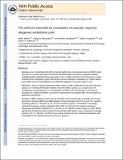Th2 cells are essential for modulation of vascular repair by allogeneic endothelial cells
Author(s)
Methe, Heiko; Nanasato, Mamoru; Spognardi, Anna-Maria; Groothuis, Adam R.; Edelman, Elazer R.
DownloadEdelman_Th2 cells.pdf (1.116Mb)
OPEN_ACCESS_POLICY
Open Access Policy
Creative Commons Attribution-Noncommercial-Share Alike
Terms of use
Metadata
Show full item recordAbstract
Background:
Endothelial cells (ECs) embedded within 3-dimensional matrices (MEEC) control lumenal inflammation and intimal hyperplasia when placed in the vascular adventitia. Matrix embedding alters endothelial immunogenicity in vitro. T-helper (Th) cell-driven host immunity is an impediment of allogeneic grafts. We aimed to identify if modulation of Th balance would affect immune compatibility and endothelial regulation of vascular repair in vivo.
Methods:
Pigs (n = 4/group) underwent carotid artery balloon injury and were left untreated (Group 1) or received perivascular porcine MEEC implants (Group 2), 12 days of cyclosporine A (CsA; Group 3), or MEEC and CsA (Group 4). Host immune reactivity was analyzed after 28 and 90 days.
Results:
MEEC treatment induced formation of EC-specific immunoglobulin (Ig) G1 antibodies (41 ± 6 mean fluorescence intensity [MFI]) and differentiation of host splenocytes into Th2, but not Th1, cytokine-producing cells (interleukin [IL]-4, 242 ± 102; IL-10, 273 ± 114 number of spots). Concomitant CsA therapy reduced IgG1 antibody frequency (25 ± 2 MFI; p < 0.02) and Th2-cytokine producing splenocytes upon MEEC treatment (IL-4, 157 ± 19; IL-10, 124 ± 26 number of spots; p < 0.05). MEECs inhibited luminal occlusion 28 and 90 days after balloon injury (12 ± 7%) vs untreated controls (68 ± 14%; p < 0.001) but to a lesser extent with concomitant CsA treatment (34 ± 13%; p < 0.02 vs Group 2).
Conclusions:
MEECs do not induce a significant Th1-driven immune response but do enhance differentiation of splenocytes into cells producing Th2 cytokine. Reduction in this Th2 response reduces the vasoregulatory effects of allogeneic ECs after injury.
Description
Author Manuscript 2011 April 1.
Date issued
2009-12Department
Harvard University--MIT Division of Health Sciences and TechnologyJournal
Journal of Heart and Lung Transplantation
Publisher
Elsevier
Citation
Methe, Heiko et al. “T-helper 2 Cells Are Essential for Modulation of Vascular Repair by Allogeneic Endothelial Cells.” The Journal of Heart and Lung Transplantation 29.4 (2010): 479–486.
Version: Author's final manuscript
ISSN
1053-2498